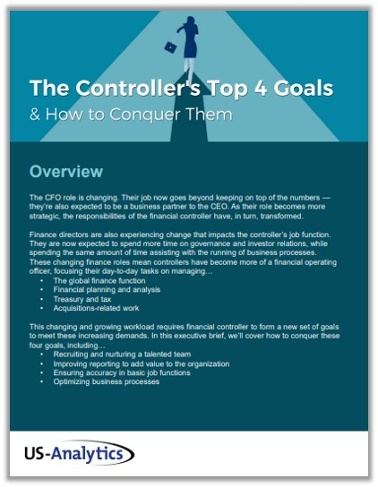As the financial controller, you’re focused on managing the accounting department while ensuring transactions are collected or paid. You also must ensure financial reporting is accurately completed, and that your organization is compliant with reporting requirements.
These are the responsibilities you knew when you took the job and the responsibilities that you’ve grown used to completing. But you’re in the position to make valuable changes and improve processes for you, your team, and even the entire organization. In this blog post, we’ll cover five ways in which you can add value.
Improving Data Quality & Speeding Up Your Close
Spreadsheets have a time and place — and it’s not keeping up with your consolidation and close. You don’t have to nix spreadsheets altogether, but they shouldn’t be at the core of your process.
Sending spreadsheets back and forth wreak havoc on your data consistency. This not only affects your team and the time it takes to close, it can impact your entire organization. The reporting generated by finance and accounting can help other departments make more strategic decisions — but not if your processes are slow and your data is inconsistent.
This is where technology comes in. There are a variety of Enterprise Performance Management (EPM) tools that can help you automate and optimize your financial close process.
For on-premises options, check out…
For cloud-based options, check out…
- Oracle Account Reconciliation Cloud Service (ARCS)
- Oracle Financial Consolidation and Close Cloud Service (FCCS)
- OneStream XF
To learn more about revamping your financial close process, read How to Modernize an Outdated Financial Close Process.
Finding & Nurturing Talent
Recruiting accountants is a difficult task — something we discuss in this executive brief. It’s important to hire talented individuals who understand where finance is going. It’s no longer just data entry and punching numbers. These roles are becoming more strategic and call for individuals who can think analytically and easily adapt to using technologies.
Analyzing Data & Giving Insight
As we alluded to in both sections above, finance is becoming more strategic. As a controller, you can truly add value by interpreting the data. It’s not just closing the books and compiling reports — you must truly understand the data and add insight.
With tools mentioned above, you’re saving time on your close, giving you more time to focus on data analysis. You can also leverage those tools (and others) to better visualize the data and identify trends. This way, you can share information across your organization and truly become an integral part of the decision-making process.
Collaborating with Other Departments
So, you have the numbers and you want to start working on analysis — how do you really know what the numbers mean? To figure out the KPIs you should be looking for, you need to reach out to other departments.
The department heads can give you insight into their operations and what success looks like for them. This will help you look for more meaningful trends, while identifying those KPIs that need to be reported on and analyzed.






